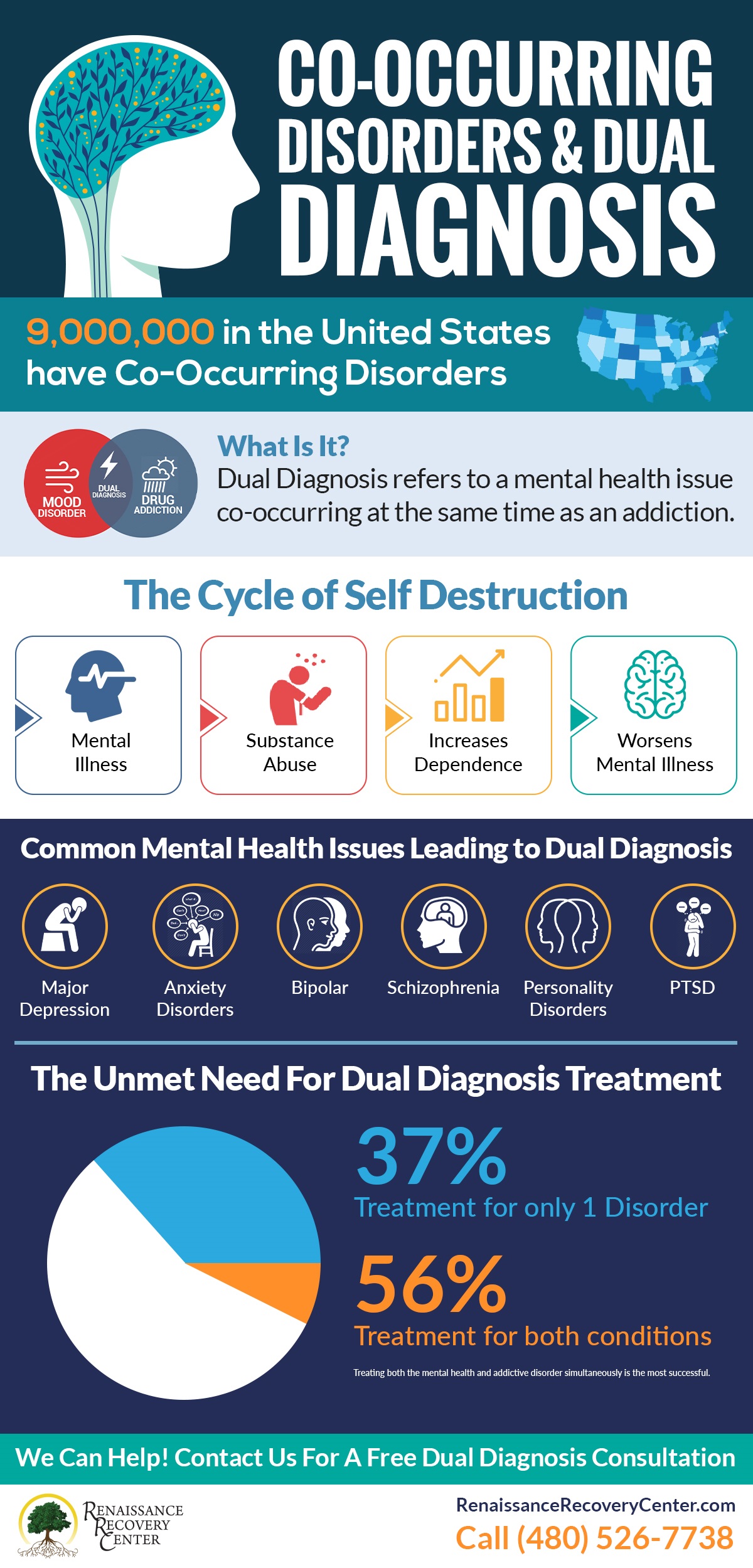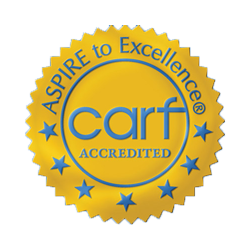According to the Substance Abuse and Mental Health Services Administration, nearly 8 million Americans struggle with co-occurring disorders. This common phenomenon, called Dual Diagnosis, refers to a mental health disorder occurring at the same time as an addiction. Studies continue to demonstrate that treating both mental health and addictive disorder simultaneously is the most successful. Renaissance Recovery Center understands how suffering from mental illness and addiction can be trying. Our addiction recovery professionals are here to help ease you or your loved one struggling with Dual Diagnosis.
Contact Us for a Free Dual Diagnosis Consultation at 480-526-7738
Many who struggle with addiction are also challenged with mental health issues. Drug and alcohol use can often be a way of self-medicating depression, anxiety, and a variety of other co-occurring disorders. For others, depression and anxiety can be attributed to the effects of substance abuse on the brain, along with the cumulative damage and loss caused by addiction. Trauma and abuse issues can also be factors in substance dependence. Whatever the cause of mental challenges, addiction recovery can be very challenging if these issues are not identified and treated.
Effects of a Co-Occurring Disorder
The effects of an untreated co-occurring disorder can be profound and widespread on every aspect of an individual's life. As the individual struggles to cope with both mental disorders and addiction, they are more at risk for the following:
- Family strife: including alienation and confrontation, divorce, loss of custody
- Loss of friends
- Loss of employment
- Homelessness: often correlated to job loss
- Jail time
- Health risks such as overdosing
- Untimely death
Risk Factors for Dual Diagnosis
Dual Diagnosis is not a rare condition and it can affect any person regardless of age, gender, or socioeconomic status; however, there are certain risk factors that increase a person’s likelihood to be diagnosed with a co-occurring disorder.
Studies show that:
- Men are more likely to be diagnosed than women
- Diagnoses are more common in individuals with lower socioeconomic status
- Adolescents with an early addiction in life are more at risk
- Individuals with pre-existing medical issues are more at risk for developing co-occurring disorders. In fact, nearly 50% of those diagnosed with a mental illness partake in substance abuse.
- US Veterans are in the at-risk category particularly due to PTSD
- Unresolved trauma can also lead a person to substance abuse as a self-coping mechanism
Addiction & Mental Health Illness Dual Diagnosis Treatment
Unfortunately, mental health and addiction were not always treated concurrently. Treating the additive disorder separate from the mental disorder typically failed, as these plans were not customized to the specific needs of each individual. Integrated intervention is favored as this treats the whole person, their strengths, weaknesses, and particular needs. Because mental health illness can lead to addiction (via self-medication) or because addiction can lead to a mental health disorder (e.g.. depression after an addiction-related job loss), no two individuals come to a Dual Diagnosis in the same way. For this reason, our therapeutic team at Renaissance Recovery Center works closely with each and every client to establish the best possible course of action to achieve healing.
What are the common treatment options?
Treatment options that modern practitioners favor include:
- Cognitive behavioral therapy
- Methods for managing depression
- Individual therapy and/or counseling
- Drug/alcohol addiction treatment
- Belief restructuring
At Renaissance Recovery Center, we provide evaluation and dual diagnosis treatment for mental health issues such as:
- Mood disorders
- Depression
- Bipolar disorder
- Anxiety disorders
- PTSD
- OCD, ADD/ADHD
- Personality disorders
- Trauma and abuse survival
We can provide referrals for medication management when indicated. Clients will receive a customized treatment plan designed to meet their individual needs. Our approach to wellness is holistic; involving group and individual counseling that addresses the spiritual, emotional and psychological aspects of recovery.
Frequently Asked Questions About Mental Health And Dual Diagnosis
If a person has either substance use disorder (SUD) or another mental disorder, such as depression, either one of the two mental conditions can lead to the other. So, each is a risk factor for the other. Further, either of the two disorders can worsen the other, significantly increasing existing symptoms and/or causing new symptoms. These relations account for the high incidence of co-occurring mental health disorders in which one condition is SUD.
Alcohol or drug abuse can also cause adverse reactions to medications used for the treatment of some mental illnesses. For example, antidepressants, and medications for anxiety or mood stabilization may be less effective when the individual is also using alcohol or an addictive drug.
If you are struggling with substance use disorder (SUD) and another mental health condition at the same time, having a dual diagnosis makes it possible for you to receive treatment for both simultaneously. This approach is more likely to lead to recovery. It can also deliver faster and greater relief. This means you can regain control of your life in a shorter period than by treating only one problem at a time.
In dual diagnosis treatment centers, mental health specialists can work with a clearer understanding of priorities. That way, therapists can focus treatment on the most pressing areas of need and help you make progress in other areas of treatment needs during the same weeks or months of therapy.
A National Institute of Health report, Comorbidity: Substance Use and Other Mental Disorders, states that 20.3 million adults in the U.S. have been diagnosed with mental health disorders other than SUD. Of those, 7.7 million people have been dual-diagnosed with substance addiction in addition to their other mental conditions. So, nearly 38% of all adults in the country afflicted with other mental disorders also have substance use disorder.
Dual Diagnosis symptoms vary with the particular co-occurring disorders. Some frequent symptoms identified in a dual diagnosis include:
- Difficulty sleeping or excessive sleeping
- Withdrawal from family, friends, and other members of their social support system
- Weight loss or gain
- Reckless behaviors that put self and/or others at risk
- Episodes of anger or violence
- Poor focus, inability to concentrate
- Mood swings, erratic behavior
- Self-medicating with alcohol or other addictive substances
- Poor performance at work or school or home
- Extreme tension or worry
- Loss of important relationships
- A sense of worthlessness
- Despair, feelings of hopelessness
- Severe anxiety
- Obsessive-compulsive behaviors
- Extreme shifts in energy level
- Hallucinations or delusions
Providing effective treatment for people with dual disorders naturally involves a more complex therapeutic strategy than required to treat a single mental health condition. Therefore, a custom treatment program tailored to address specific individual needs for overcoming both disorders is necessary for good long-term results.
Top-rated dual diagnosis treatment centers like Renaissance Recovery, Gilbert, Arizona, provide today’s best evidence-based treatment for our clients with dual diagnoses. Custom treatment programs treat both drug or alcohol addiction and co-occurring disorders.
Our team of dual-diagnosis and treatment professionals includes MDs, mental health specialists, addiction recovery specialists, and various therapists for particular types of treatment. These include specialists in the combined treatment of SUD and other mental health disorders. Providing this caliber of therapeutic team is the first requirement for administering the best possible treatment for our clients in cases of dual diagnosis.












